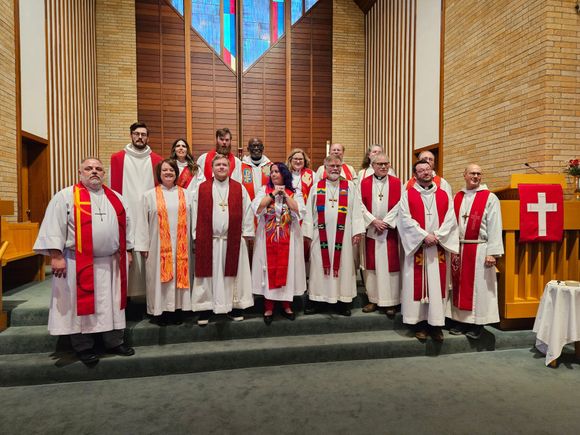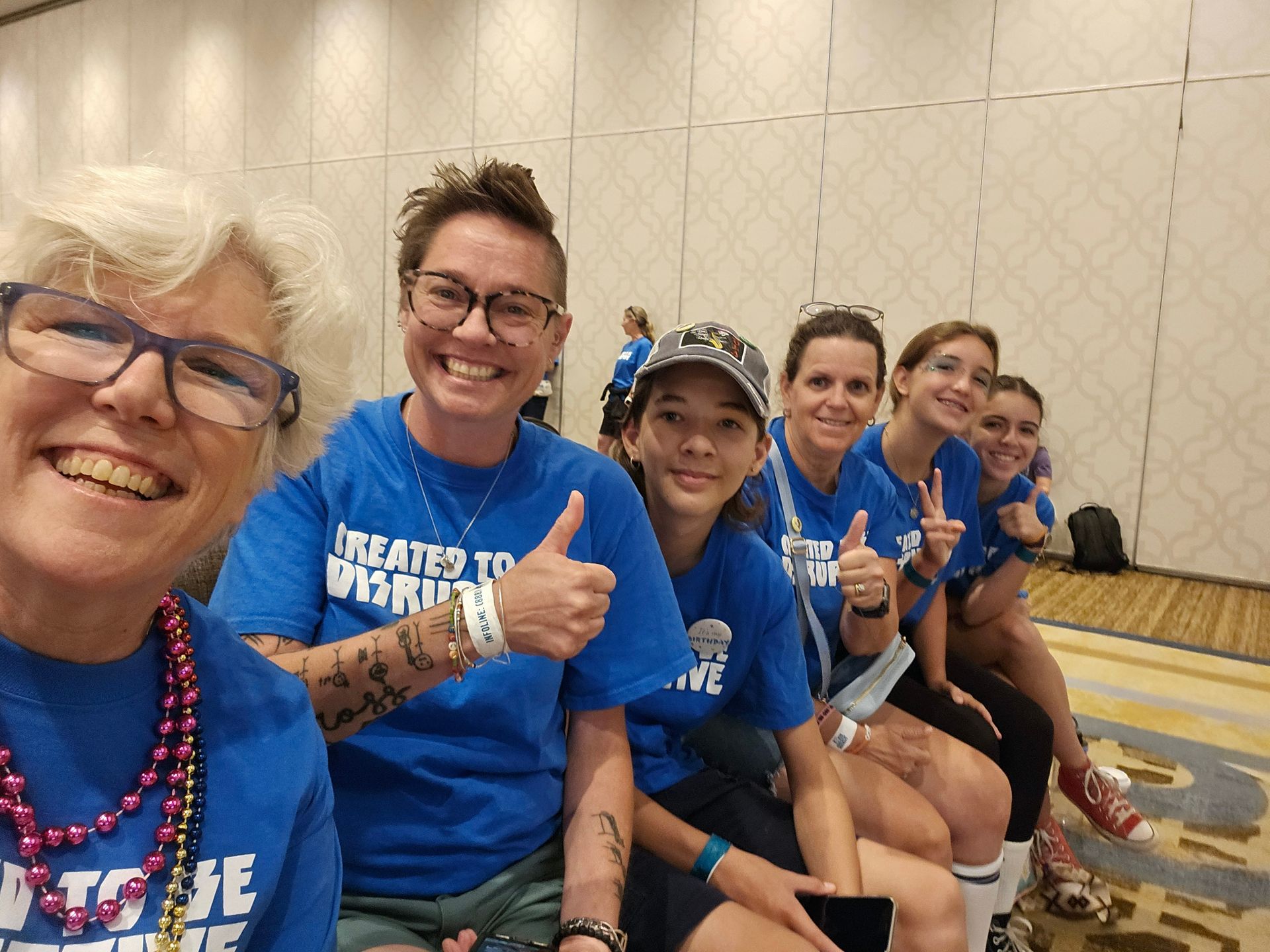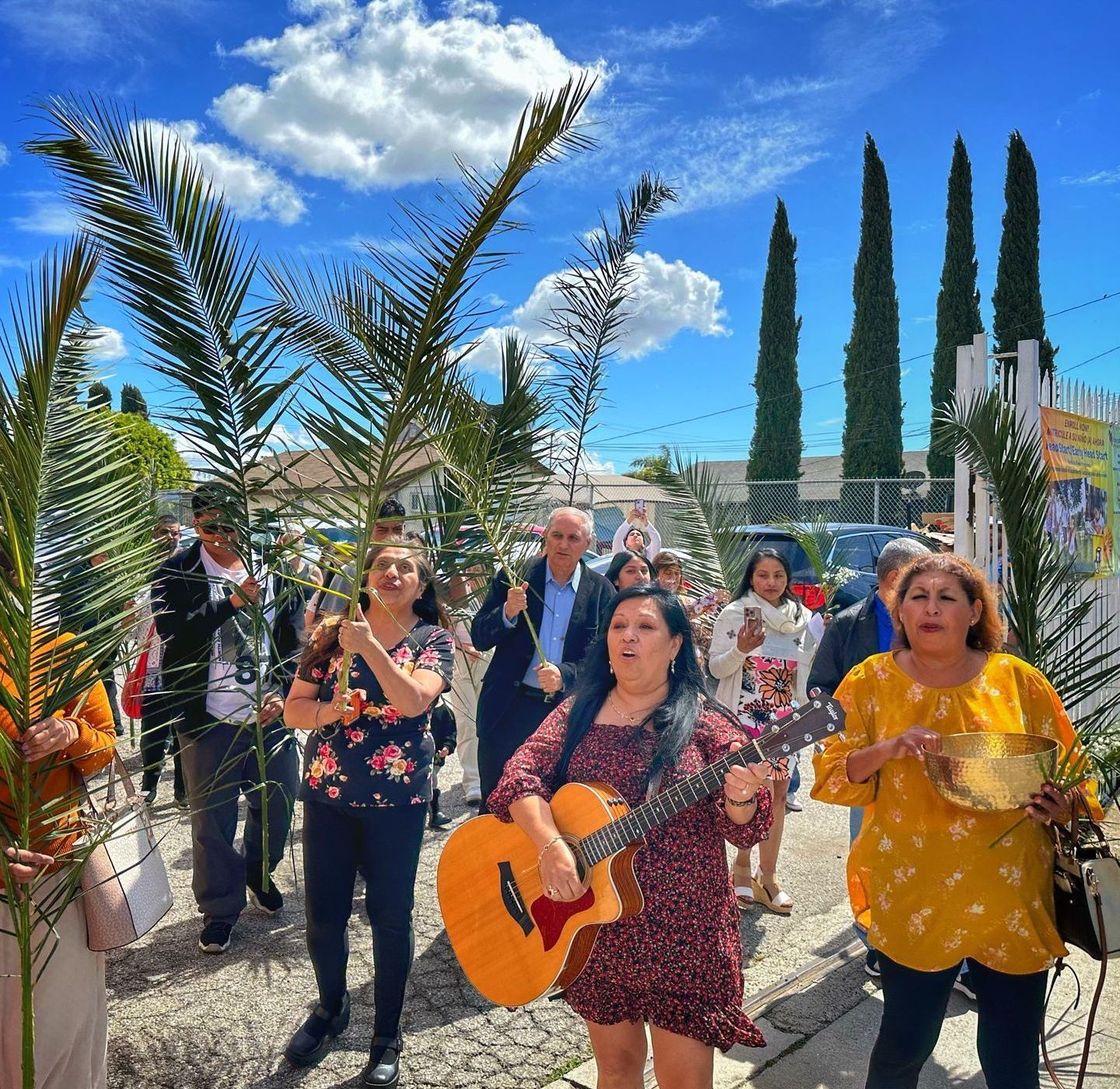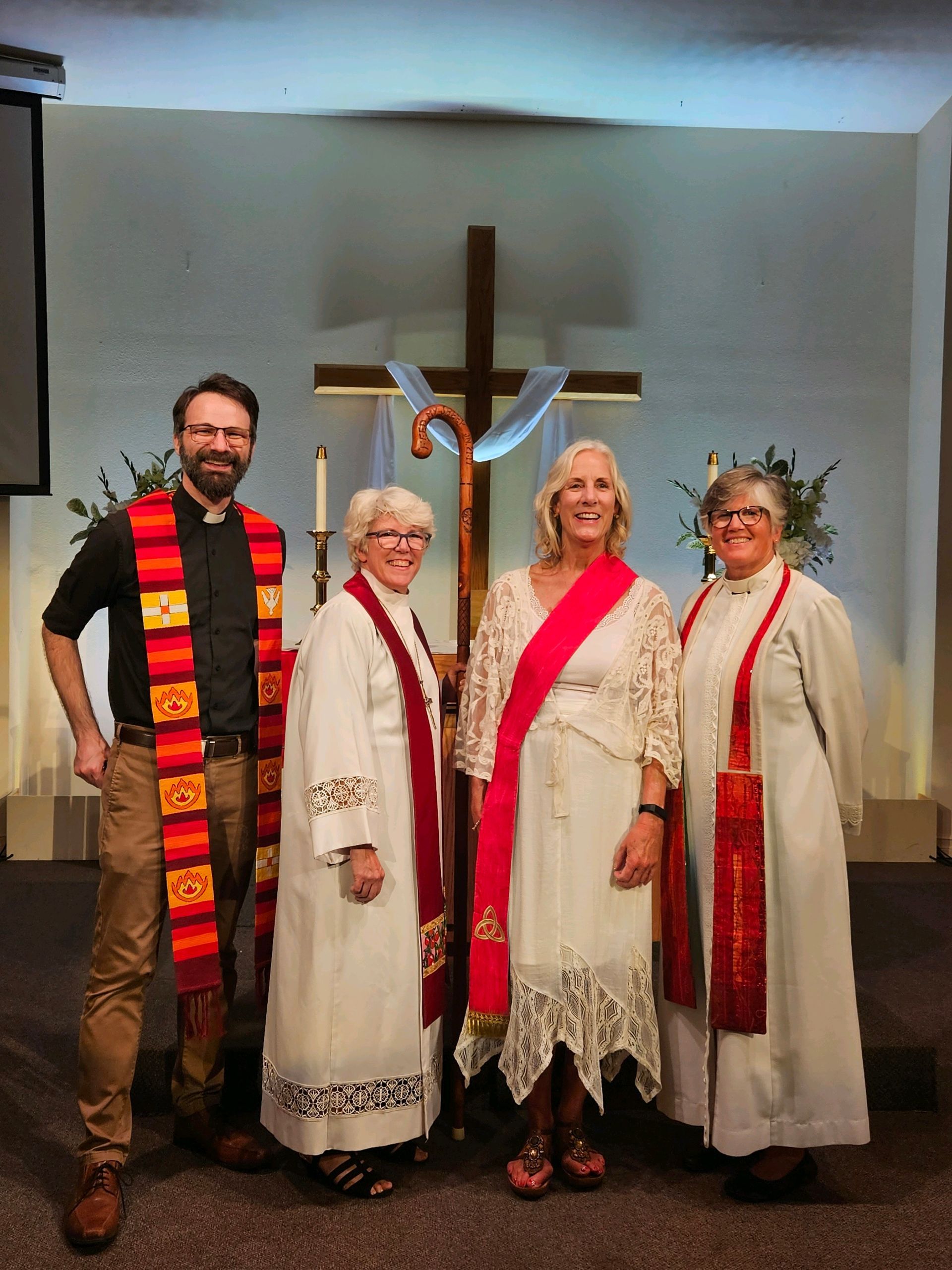By Bishop Brenda Bos
•
June 28, 2024
“Now the disciples had forgotten to bring any bread, and they had only one loaf with them in the boat…And becoming aware of it, Jesus said to them, ‘Why are you talking about having no bread? Do you still not perceive and understand? Are your hearts hardened?...Do you not remember? When I broke the fives loaves for the five thousand, how many baskets full of broken pieces did you collect?’ They said to him, ‘Twelve.’ And the seven for the four thousand, how many baskets full of broken pieces did you collect?’ And they said to him, ‘Seven.’ Then he said to them, ‘Do you not yet understand?’ Mark 8:14-21, selected verses. You may be confused to read this text as I send you Easter greetings. Generally, a bishop’s greeting celebrates the empty tomb and claims the promise of resurrection. And here I am, stuck in the boat with hungry disciples. What gives? When I was considering what Easter means to me this year, this passage came to mind. I can relate to disciples who had seen the miracles of Jesus repeatedly but still doubted he could meet their needs. Sure, the disciples went on to be the pillars of our church. It was their witness that ushered in the Christian church. And yet, at this moment in their story, they are still confused followers of Jesus. Even though they participated in the feeding of the 5000 and the 4000, they still did not trust Jesus to feed them. I write to some of you who are leaders in the church. People listen to your witness of the gospel. Some of us are in the part of the story where we are confused followers of Jesus. We have seen miraculous things in our lives, but we still doubt Jesus. Let me be honest, I have seen miraculous things, and I still doubt Jesus will come through in the future, even though He has come through countless times in the past. So when I find myself sitting in this boat, with these disciples, I focus on their hunger and doubt, not on the fact that they will become important leaders in the church. Today they are hungry, and cannot imagine Jesus will come through. Perhaps the church finds itself in the same spot. There are plenty of reasons to be fearful. The violence in the world is overwhelming. Wars rage on, terrorists attack, guns are out of control, and televised verbal abuse and taunts are constant. The church is in decline, our schools suffer, our families struggle to remain intact. We tend to think our current situation is the worst anyone has ever experienced. And frequently, we believe God will stop caring today, after a lifetime of proof that God has remained faithful. As we enter the Easter season, I encourage you to come to Jesus with all your doubts. The disciples did, and Jesus remained patient. And later, Jesus sent the Holy Spirit, which, apparently, was the only way those disciples would come to fully trust Jesus. It is only after Pentecost, and the appearance of the Holy Spirit, that the disciples could boldly proclaim Jesus’ saving way. So the church finds itself at this moment in the story: the crucifixion has only just happened. The resurrection has taken place, but no one understands what Jesus is capable of. The Holy Spirit has not yet come to make it clearer. Where do you find yourself in the story? Full of hope, but frightened? Despairing and cannot imagine a brighter future? Hungry, and doubting Jesus knows it? My friends, me too. And then I remember all that Jesus has done in my life. And I embrace the Holy Spirit, who is clearly alive in my life. That same Jesus is in your life, and the Holy Spirit is capable of rekindling your faith and hope. These are trying times, I cannot deny it. But we have Jesus with us, alive, powerful, healing, feeding, loving, caring. Trust in that Jesus, who has been with you so many times, and will be in the future. Jesus is alive, well, and longing to bring you to a vibrant, faith-filled life. Alleluia! Easter blessings, Bishop Brenda Bos Easter 2024 Mensaje de Pascua del Obispo - 2024 “Ahora los discípulos se habían olvidado de traer pan, y solo tenían un pan con ellos en el barco… Y al darse cuenta de esto, Jesús les dijo: ‘¿Por qué hablan de no tener pan? ¿Todavía no perciben ni entienden? ¿Tienen el corazón endurecido?... ¿No recuerdan? Cuando partí los cinco panes para los cinco mil, ¿cuántas canastas llenas de pedazos recogieron?’ Ellos le dijeron: ‘Doce’. Y los siete para los cuatro mil, ¿cuántas canastas llenas de pedazos recogieron?’ Y ellos le dijeron: ‘Siete’. Entonces él les dijo: ‘¿Todavía no entienden?’” Marcos 8:14-21, versículos seleccionados. Puede que estén confundidos al leer este texto mientras les envío saludos de Pascua. Por lo general, el saludo de un obispo celebra la tumba vacía y reclama la promesa de la resurrección. Y aquí estoy, atrapado en el barco con discípulos hambrientos. ¿Qué pasa? Cuando consideraba lo que significa la Pascua para mí este año, este pasaje vino a mi mente. Puedo identificarme con los discípulos que habían visto los milagros de Jesús repetidamente, pero aún dudaban de que pudiera satisfacer sus necesidades. Claro, los discípulos pasaron a ser los pilares de nuestra iglesia. Fue su testimonio el que dio inicio a la iglesia cristiana. Y sin embargo, en este momento de su historia, todavía son seguidores confundidos de Jesús. A pesar de que participaron en la alimentación de los 5000 y los 4000, aún no confiaban en que Jesús los alimentaría. Escribo a algunos de ustedes que son líderes en la iglesia. La gente escucha su testimonio del evangelio. Algunos de nosotros estamos en la parte de la historia donde somos seguidores confundidos de Jesús. Hemos visto cosas milagrosas en nuestras vidas, pero aún dudamos de Jesús. Permítanme ser honesta, he visto cosas milagrosas, y aún dudo de que Jesús vendrá en el futuro, a pesar de que ha venido innumerables veces en el pasado. Así que cuando me encuentro sentada en este barco, con estos discípulos, me centro en su hambre y duda, no en el hecho de que se convertirán en líderes importantes en la iglesia. Hoy tienen hambre y no pueden imaginar que Jesús vendrá en su ayuda. Quizás la iglesia se encuentra en la misma situación. Hay muchas razones para tener miedo. La violencia en el mundo es abrumadora. Las guerras continúan, los terroristas atacan, las armas están fuera de control, los abusos verbales y las burlas televisadas son constantes. La iglesia está en declive, nuestras escuelas sufren, nuestras familias luchan por mantenerse intactas. Tendemos a pensar que nuestra situación es la peor experiencia. Y frecuentemente creemos que Dios dejará de preocuparse hoy, después de toda una vida de pruebas de que Dios ha permanecido fiel. Al entrar en la temporada de Pascua, los animo a acudir a Jesús con todas sus dudas. Los discípulos lo hicieron, y Jesús permaneció paciente. Y más tarde, Jesús envió al Espíritu Santo, que, aparentemente, era la única forma en que aquellos discípulos llegarían a confiar plenamente en Jesús. Solo después de Pentecostés, y la aparición del Espíritu Santo, los discípulos pudieron proclamar audazmente el camino salvador de Jesús. Entonces, la iglesia se encuentra en este momento de la historia: la crucifixión acaba de ocurrir. La resurrección ha tenido lugar, pero nadie entiende de lo que Jesús es capaz de hacer. El Espíritu Santo aún no ha llegado para aclararlo. ¿Dónde se encuentran en la historia? ¿Lleno de esperanza, pero asustado? ¿Desesperado y no puedes imaginar un futuro más brillante? ¿Hambriento y dudando de que Jesús lo sepa? Mis amigos, yo también. Y luego recuerdo todo lo que Jesús ha hecho en mi vida. Y abrazo al Espíritu Santo, que está claramente vivo en mi vida. Ese mismo Jesús está en sus vidas, y el Espíritu Santo es capaz de avivar su fe y esperanza. Estos son tiempos difíciles, no puedo negarlo. Pero tenemos a Jesús con nosotros, vivo, poderoso, sanador, alimentador, amoroso, cuidador. Confiemos en ese Jesús, que ha estado junto a nosotros tantas veces, y estará en el futuro. Jesús está vivo, bien, y ansioso por llevarlos a una vida vibrante y llena de fe. ¡Aleluya! Bendiciones de Pascua, Obispo Brenda Bos Pascua 2024 主教的复活节寄语 – 2024 “门徒忘记带饼,除了船上有一块饼,他们什么都没有……耶稣知道了,就对他们说,‘你们为什么谈论没有饼呢?你们还不明白吗?你们的心还是刚硬的吗?…你们不记得吗?我曾为五千人掰开五饼,你们收了多少篮子的零碎?’他们说,‘十二筐。’他又问,‘那为四千人掰开的七饼,你们收了多少篮子的零碎?’他们说,‘七筐。’然后他对他们说,‘你们还不明白吗?’ 马可福音 8:14-21 选段。 当我向你们致以复活节的问候时,你们可能会对这段经文感到困惑。通常情况下,主教的问候会庆祝空坟墓,宣扬复活的应许。而我现在却和饥肠辘辘的门徒困在船上,这又是怎么回事呢? 今年当我思考复活节对我来说意味着什么时,这段经文就浮现在脑海里。我能理解门徒们的情况,他们虽然多次目睹耶稣行的神迹,却仍然怀疑他能否满足他们的需要。当然,门徒们后来成为了我们教会的支柱。正是他们的见证开启了基督教教会的时代。然而,在他们故事的这一刻,他们仍然是困惑的耶稣跟随者。尽管他们参与了五饼二鱼和七饼四鱼的神迹,他们仍然不信任耶稣能养活他们。 我写给你们当中的一些教会领袖。人们聆听你们传讲福音的见证。我们当中有些人正处于故事中困惑跟随耶稣的部分。我们已经在生活中见证过奇迹,但仍然怀疑耶稣。坦白地说,我也见过奇迹,但我仍然怀疑耶稣将来是否会帮助我,尽管他过去无数次帮助了我。所以,当我发现自己和这些门徒坐在同一条船上时,我关注的是他们的饥饿和怀疑,而不是他们将来会成为重要的教会领袖。今天他们饥肠辘辘,无法想象耶稣会帮助他们。 也许教会也处在同样的境地。 有许多理由感到恐惧。世界上的暴力令人震惊。战争仍在继续,恐怖分子袭击,枪支失控,电视上充斥着谩骂和嘲讽。教会衰落,我们的学校面临困境,我们的家庭难以维持完整。我们倾向于认为我们目前的处境是前所未有的糟糕。我们常常认为他今天就会停止关心我们,但我们用一生去见证上帝仍然是信实的。 随着我们进入复活节,我鼓励你们带着所有的疑虑来到耶稣面前。门徒们这样做了,耶稣仍然耐心相待。后来,耶稣派遣了圣灵,这显然是那些门徒完全信靠耶稣的唯一途径。只有在五旬节和圣灵降临之后,门徒们才能大胆地宣扬耶稣的救赎之道。 因此,教会现在处于故事的这一刻:钉十字架刚刚发生。复活已经发生,但没有人理解耶稣的能力。圣灵还没有降临,使其更加清晰。你在故事中找到自己了吗?充满希望,却又害怕?绝望,无法想象更美好的未来?饥肠辘辘,怀疑耶稣知道吗? 我的朋友们,我也是如此。然后我回想耶稣在我生命中所做的一切。我拥抱圣灵,它在我生命中显然是活着的。同样的耶稣也在你的生命中,圣灵能够重新点燃你的信心和希望。 毫无疑问,这是艰难的时刻。但我们有耶稣与我们同在,他活着,充满力量,治愈,供养,爱护,关心。 要信靠这位耶稣,他多次与你同在,将来也会与你同在。耶稣还活着并渴望将你带到一个充满活力、充满信仰的生活中。哈利路亚! 复活节祝福, 布伦达∙博斯主教 2024 年复活节












